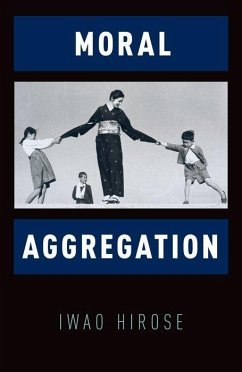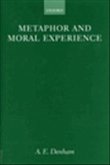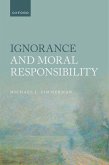Iwao Hirose
Moral Aggregation
Schade – dieser Artikel ist leider ausverkauft. Sobald wir wissen, ob und wann der Artikel wieder verfügbar ist, informieren wir Sie an dieser Stelle.
Iwao Hirose
Moral Aggregation
- Gebundenes Buch
- Merkliste
- Auf die Merkliste
- Bewerten Bewerten
- Teilen
- Produkt teilen
- Produkterinnerung
- Produkterinnerung
This book elucidates the theoretical structure and scope of interpersonal and intra-personal aggregation--a trade-off between benefits to a group of individuals and losses to another group of individuals--and defends a form of aggregation -- formal aggregation -- that resolves a variety of outstanding problems arising from the conventional understanding of aggregation, including the Number Problem concerning the moral relevance of the number of individuals.
Andere Kunden interessierten sich auch für
![Metaphor and Moral Experience Metaphor and Moral Experience]() A E DenhamMetaphor and Moral Experience225,99 €
A E DenhamMetaphor and Moral Experience225,99 €![The Oxford Handbook of Moral Responsibility The Oxford Handbook of Moral Responsibility]() The Oxford Handbook of Moral Responsibility236,99 €
The Oxford Handbook of Moral Responsibility236,99 €![Moral Fictionalism and Religious Fictionalism Moral Fictionalism and Religious Fictionalism]() Moral Fictionalism and Religious Fictionalism109,99 €
Moral Fictionalism and Religious Fictionalism109,99 €![The Oxford Handbook of Moral Realism The Oxford Handbook of Moral Realism]() David CoppThe Oxford Handbook of Moral Realism191,99 €
David CoppThe Oxford Handbook of Moral Realism191,99 €![Ignorance and Moral Responsibility Ignorance and Moral Responsibility]() Michael J ZimmermanIgnorance and Moral Responsibility133,99 €
Michael J ZimmermanIgnorance and Moral Responsibility133,99 €![The Oxford Handbook of Moral Psychology The Oxford Handbook of Moral Psychology]() The Oxford Handbook of Moral Psychology274,99 €
The Oxford Handbook of Moral Psychology274,99 €![Divine Commands and Moral Requirements Divine Commands and Moral Requirements]() Philip L QuinnDivine Commands and Moral Requirements161,99 €
Philip L QuinnDivine Commands and Moral Requirements161,99 €-
This book elucidates the theoretical structure and scope of interpersonal and intra-personal aggregation--a trade-off between benefits to a group of individuals and losses to another group of individuals--and defends a form of aggregation -- formal aggregation -- that resolves a variety of outstanding problems arising from the conventional understanding of aggregation, including the Number Problem concerning the moral relevance of the number of individuals.
Produktdetails
- Produktdetails
- Verlag: Hurst & Co.
- Seitenzahl: 250
- Erscheinungstermin: 4. November 2014
- Englisch
- Abmessung: 213mm x 145mm x 28mm
- Gewicht: 386g
- ISBN-13: 9780199933686
- ISBN-10: 0199933685
- Artikelnr.: 47870693
- Herstellerkennzeichnung
- Libri GmbH
- Europaallee 1
- 36244 Bad Hersfeld
- gpsr@libri.de
- Verlag: Hurst & Co.
- Seitenzahl: 250
- Erscheinungstermin: 4. November 2014
- Englisch
- Abmessung: 213mm x 145mm x 28mm
- Gewicht: 386g
- ISBN-13: 9780199933686
- ISBN-10: 0199933685
- Artikelnr.: 47870693
- Herstellerkennzeichnung
- Libri GmbH
- Europaallee 1
- 36244 Bad Hersfeld
- gpsr@libri.de
Iwao Hirose is Associate Professor at the Philosophy Department and the School of Environment, McGill University. He is the author of Egalitarianism (2014), co-author of The Ethics of Health Care Rationing (with Greg Bognar, 2014), and co-editor of Weighing and Reasoning (with Andrew Reisner; forthcoming from OUP) and The Oxford Handbook of Value Theory (with Jonas Olson; forthcoming from OUP).
I. A Theory of Aggregation
1 Why Aggregation?
1.1 Aggregation in ethics
1.2 Example I: QALY aggregation
1.3 Example II: Taurek's Rescue Case Rescue Case
1.4 The structure of this book
2 The Structure of Aggregation
2.1 Aggregation defined
2.2 What is aggregative and what is not?
2.3 The structure of interpersonal aggregation
2.3.1 Interpersonal comparability
2.3.2 Impartiality
2.3.3 Pareto
2.3.4 Continuity
3 Formal and Substantive Aggregation
3.1 Counterexample to interpersonal aggregation: the World Cup Case
3.2 Hidden assumptions
3.3 Substantive and formal aggregation aggregation
3.4 Formal aggregation in perspective
4 Aggregation and the Separateness of Persons
4.1 The separateness of persons: Rawls's strict account
4.2 The wider account
4.3 Defusing the wider account
4.4 The separateness objection and contractarianism
4.5 Scanlon's contractualism
5 Intra-Personal Aggregation
5.1 Who supports intra-personal aggregation?
5.2 The structure of intra-personal aggregation
5.3 The objection to intra-personal continuity
5.4 The objection to temporal symmetry
II The Number Problem
6 Taurek's argument for the coin-toss
6.1 Taurek and the Rescue Case
6.2 Taurek (1): the permissibility claim
6.3 Taurek (2): the no-worse claim
6.4 Taurek (3): the equal respect claim
6.5 Two remarks on Taurek's argument Taurek's argument
6.6 Critics of aggregation (1): Nozick
6.7 Critics of aggregation (2): Rawls
6.8 Critics of aggregation (3): Nagel
6.9 Three solutions and many intuitions
7 Four Responses:
Kavka, Kamm, Scanlon, and Schelling
7.1 How to deal with Taurek's claim?
7.2 Kavka on Taurek
7.3 The Kamm-Scanlon argument Kamm-Scanlon argument
7.4 Kamm's Argument for Best Outcomes
7.5 Schelling's probabilistic argument
8 Irrelevant Utilities and Formal Aggregation
8.1 The principle of irrelevant utilities
8.2 The objection to the principle of irrelevant utilities
8.3 Taking unfairness seriously
8.4 The Large Scale Rescue Case revisited
8.5 The force of aggregation
9 Weighted Lotteries
9.1 The third proposal: weighted lotteries
9.2 The appeal of weighted lotteries
9.3 The procedure of proportional chances: two criticisms criticisms
9.4 The general weighted lotteries: two-step criticism
9.5 An additional problem
Conclusion
1 Why Aggregation?
1.1 Aggregation in ethics
1.2 Example I: QALY aggregation
1.3 Example II: Taurek's Rescue Case Rescue Case
1.4 The structure of this book
2 The Structure of Aggregation
2.1 Aggregation defined
2.2 What is aggregative and what is not?
2.3 The structure of interpersonal aggregation
2.3.1 Interpersonal comparability
2.3.2 Impartiality
2.3.3 Pareto
2.3.4 Continuity
3 Formal and Substantive Aggregation
3.1 Counterexample to interpersonal aggregation: the World Cup Case
3.2 Hidden assumptions
3.3 Substantive and formal aggregation aggregation
3.4 Formal aggregation in perspective
4 Aggregation and the Separateness of Persons
4.1 The separateness of persons: Rawls's strict account
4.2 The wider account
4.3 Defusing the wider account
4.4 The separateness objection and contractarianism
4.5 Scanlon's contractualism
5 Intra-Personal Aggregation
5.1 Who supports intra-personal aggregation?
5.2 The structure of intra-personal aggregation
5.3 The objection to intra-personal continuity
5.4 The objection to temporal symmetry
II The Number Problem
6 Taurek's argument for the coin-toss
6.1 Taurek and the Rescue Case
6.2 Taurek (1): the permissibility claim
6.3 Taurek (2): the no-worse claim
6.4 Taurek (3): the equal respect claim
6.5 Two remarks on Taurek's argument Taurek's argument
6.6 Critics of aggregation (1): Nozick
6.7 Critics of aggregation (2): Rawls
6.8 Critics of aggregation (3): Nagel
6.9 Three solutions and many intuitions
7 Four Responses:
Kavka, Kamm, Scanlon, and Schelling
7.1 How to deal with Taurek's claim?
7.2 Kavka on Taurek
7.3 The Kamm-Scanlon argument Kamm-Scanlon argument
7.4 Kamm's Argument for Best Outcomes
7.5 Schelling's probabilistic argument
8 Irrelevant Utilities and Formal Aggregation
8.1 The principle of irrelevant utilities
8.2 The objection to the principle of irrelevant utilities
8.3 Taking unfairness seriously
8.4 The Large Scale Rescue Case revisited
8.5 The force of aggregation
9 Weighted Lotteries
9.1 The third proposal: weighted lotteries
9.2 The appeal of weighted lotteries
9.3 The procedure of proportional chances: two criticisms criticisms
9.4 The general weighted lotteries: two-step criticism
9.5 An additional problem
Conclusion
I. A Theory of Aggregation
1 Why Aggregation?
1.1 Aggregation in ethics
1.2 Example I: QALY aggregation
1.3 Example II: Taurek's Rescue Case Rescue Case
1.4 The structure of this book
2 The Structure of Aggregation
2.1 Aggregation defined
2.2 What is aggregative and what is not?
2.3 The structure of interpersonal aggregation
2.3.1 Interpersonal comparability
2.3.2 Impartiality
2.3.3 Pareto
2.3.4 Continuity
3 Formal and Substantive Aggregation
3.1 Counterexample to interpersonal aggregation: the World Cup Case
3.2 Hidden assumptions
3.3 Substantive and formal aggregation aggregation
3.4 Formal aggregation in perspective
4 Aggregation and the Separateness of Persons
4.1 The separateness of persons: Rawls's strict account
4.2 The wider account
4.3 Defusing the wider account
4.4 The separateness objection and contractarianism
4.5 Scanlon's contractualism
5 Intra-Personal Aggregation
5.1 Who supports intra-personal aggregation?
5.2 The structure of intra-personal aggregation
5.3 The objection to intra-personal continuity
5.4 The objection to temporal symmetry
II The Number Problem
6 Taurek's argument for the coin-toss
6.1 Taurek and the Rescue Case
6.2 Taurek (1): the permissibility claim
6.3 Taurek (2): the no-worse claim
6.4 Taurek (3): the equal respect claim
6.5 Two remarks on Taurek's argument Taurek's argument
6.6 Critics of aggregation (1): Nozick
6.7 Critics of aggregation (2): Rawls
6.8 Critics of aggregation (3): Nagel
6.9 Three solutions and many intuitions
7 Four Responses:
Kavka, Kamm, Scanlon, and Schelling
7.1 How to deal with Taurek's claim?
7.2 Kavka on Taurek
7.3 The Kamm-Scanlon argument Kamm-Scanlon argument
7.4 Kamm's Argument for Best Outcomes
7.5 Schelling's probabilistic argument
8 Irrelevant Utilities and Formal Aggregation
8.1 The principle of irrelevant utilities
8.2 The objection to the principle of irrelevant utilities
8.3 Taking unfairness seriously
8.4 The Large Scale Rescue Case revisited
8.5 The force of aggregation
9 Weighted Lotteries
9.1 The third proposal: weighted lotteries
9.2 The appeal of weighted lotteries
9.3 The procedure of proportional chances: two criticisms criticisms
9.4 The general weighted lotteries: two-step criticism
9.5 An additional problem
Conclusion
1 Why Aggregation?
1.1 Aggregation in ethics
1.2 Example I: QALY aggregation
1.3 Example II: Taurek's Rescue Case Rescue Case
1.4 The structure of this book
2 The Structure of Aggregation
2.1 Aggregation defined
2.2 What is aggregative and what is not?
2.3 The structure of interpersonal aggregation
2.3.1 Interpersonal comparability
2.3.2 Impartiality
2.3.3 Pareto
2.3.4 Continuity
3 Formal and Substantive Aggregation
3.1 Counterexample to interpersonal aggregation: the World Cup Case
3.2 Hidden assumptions
3.3 Substantive and formal aggregation aggregation
3.4 Formal aggregation in perspective
4 Aggregation and the Separateness of Persons
4.1 The separateness of persons: Rawls's strict account
4.2 The wider account
4.3 Defusing the wider account
4.4 The separateness objection and contractarianism
4.5 Scanlon's contractualism
5 Intra-Personal Aggregation
5.1 Who supports intra-personal aggregation?
5.2 The structure of intra-personal aggregation
5.3 The objection to intra-personal continuity
5.4 The objection to temporal symmetry
II The Number Problem
6 Taurek's argument for the coin-toss
6.1 Taurek and the Rescue Case
6.2 Taurek (1): the permissibility claim
6.3 Taurek (2): the no-worse claim
6.4 Taurek (3): the equal respect claim
6.5 Two remarks on Taurek's argument Taurek's argument
6.6 Critics of aggregation (1): Nozick
6.7 Critics of aggregation (2): Rawls
6.8 Critics of aggregation (3): Nagel
6.9 Three solutions and many intuitions
7 Four Responses:
Kavka, Kamm, Scanlon, and Schelling
7.1 How to deal with Taurek's claim?
7.2 Kavka on Taurek
7.3 The Kamm-Scanlon argument Kamm-Scanlon argument
7.4 Kamm's Argument for Best Outcomes
7.5 Schelling's probabilistic argument
8 Irrelevant Utilities and Formal Aggregation
8.1 The principle of irrelevant utilities
8.2 The objection to the principle of irrelevant utilities
8.3 Taking unfairness seriously
8.4 The Large Scale Rescue Case revisited
8.5 The force of aggregation
9 Weighted Lotteries
9.1 The third proposal: weighted lotteries
9.2 The appeal of weighted lotteries
9.3 The procedure of proportional chances: two criticisms criticisms
9.4 The general weighted lotteries: two-step criticism
9.5 An additional problem
Conclusion








